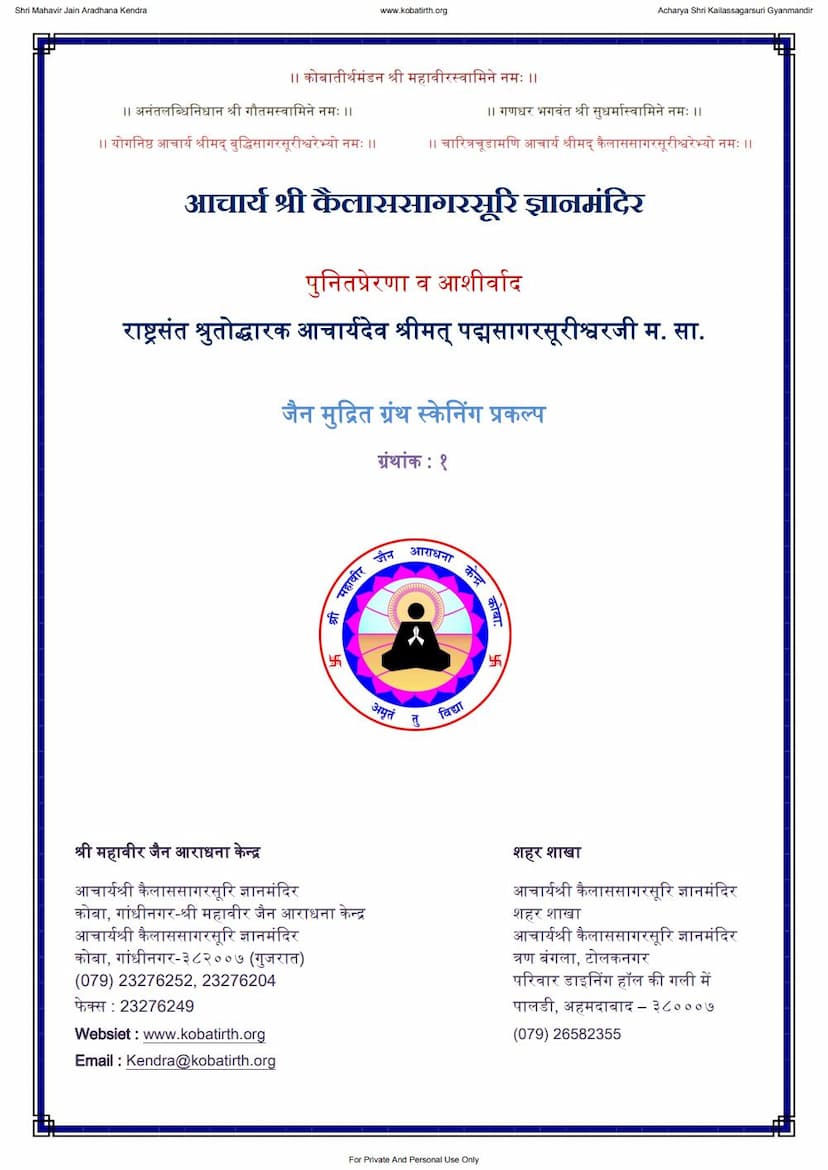Mahavir Prince Of Peace
Added to library: September 2, 2025

Summary
Here's a comprehensive summary of the Jain text "Mahavir: Prince of Peace" by Ranchor Prime, based on the provided pages:
Book Overview:
"Mahavir: Prince of Peace" by Ranchor Prime is a beautifully illustrated biographical account of the life and teachings of Lord Mahavira, the 24th Tirthankara (spiritual teacher) of Jainism. The book aims to present Mahavira's life and message in a clear, accessible style, highlighting his core principles, particularly ahimsa (non-violence). It caters to both those new to Jainism and those seeking a deeper understanding of its founder.
Key Aspects and Themes:
- The Life of Mahavira: The book meticulously traces Mahavira's journey from his birth as a prince in Vaishali to his eventual enlightenment and public ministry. It details the significant events, challenges, and spiritual developments throughout his life.
- Core Jain Teachings: Central to the narrative are the foundational principles of Jainism, including:
- Ahimsa (Non-violence): The paramount importance of compassion, kindness, and non-harming towards all living beings.
- Right Knowledge, Right Faith, and Right Conduct: The path to liberation (nirvana).
- Vitaraga (Freedom from attachment and aversion): The ideal state of being, achieved by conquering inner enemies like anger, ego, greed, and illusion.
- Five Great Vows: Nonviolence, Truthfulness, Non-stealing, Celibacy, and Non-attachment.
- Anekantavada (Many Ways): The doctrine of manifold perspectives, fostering tolerance and understanding of different viewpoints.
- Parasparopagraho Jivanam (Interdependence of all living beings): The recognition of the interconnectedness of all life.
- Spiritual Journey and Austerities: The book emphasizes Mahavira's rigorous ascetic practices, his unwavering determination in the face of extreme hardship, and his commitment to overcoming his own physical and mental frailties to achieve spiritual perfection.
- Parables and Miracles: The narrative is interspersed with accounts of Mahavira's encounters with various beings, including gods, demons, and ordinary people, often involving symbolic dreams and supernatural events that illustrate his spiritual power and the impact of his teachings.
- The Concept of Tirthankara: The book explains that Mahavira was the last of a lineage of 24 Tirthankaras, individuals who have achieved enlightenment and created a path for others to follow across the river of birth and death.
- Ethical and Environmental Relevance: The preface by Michael Tobias highlights the contemporary relevance of Mahavira's teachings, particularly in terms of environmental consciousness, compassion, and ethical living in the 21st century.
- Illustrations: The book is richly illustrated by B.G. Sharma, whose artwork is described as tranquil and charming, bringing the story to life.
Key Life Events and Narratives:
- Descent to Earth and Birth: The story begins with the soul of Mahavira descending from the heavens to be born as a prince. It recounts the legend of his initial conception in the womb of Devananda and the subsequent transfer to Queen Trisala by the god Harinegameshi.
- Dreams and Prophecies: Queen Trisala experiences auspicious dreams that foretell the birth of a wise and compassionate child, prophesying his future role as a great teacher.
- Overcoming Adversaries: The book details Mahavira's early encounters with supernatural beings, including a jealous god disguised as a snake and a demon, whom he defeats through his courage, wisdom, and compassion, earning him the name "Mahavira" (Great Hero).
- Education and Divine Recognition: An episode describes Mahavira's divine test in school, where he effortlessly answers difficult questions, impressing Indra (King of Gods) and solidifying his reputation as a wise soul.
- Friend to All and Renunciation: As a prince, Mahavira demonstrates profound kindness and non-violence, refusing to participate in hunting and advocating for compassion towards all living beings. Despite his marriage and family life, his heart yearned for renunciation.
- The Great Renunciation: After his parents' passing, Mahavira, at the age of 30, leaves his royal life, possessions, and family to embark on a path of severe asceticism and meditation. This is depicted as a momentous occasion with a ceremonial procession.
- Endurance of Hardships: The book vividly describes Mahavira's twelve and a half years of extreme penance, enduring hunger, thirst, cold, and physical assaults from both humans and supernatural entities without complaint, demonstrating immense patience and equanimity.
- Enlightenment (Kevala Jnana): At the age of 42, under a teak tree by the River Rujuvalika, Mahavira achieves absolute knowledge (kevala jnana), becoming a Jina (victor) and a Tirthankara.
- First Sermon and Disciples: Following his enlightenment, Mahavira delivers his first sermon in a divine assembly (Samavasarana). He attracts and converts eleven renowned philosophers, including Indrabhuti Gautama, who become his chief disciples.
- Thirty Years of Preaching: For three decades, Mahavira travels throughout India, spreading his message of non-violence, truth, and self-control, establishing four orders of followers (monks, nuns, laymen, and laywomen).
- Final Departure: At the age of 72, Mahavira attains his final liberation (moksha), leaving his mortal body. His departure is marked by divine celebration and the continuation of his teachings through his chief disciple, Gautama Swami.
Foreword and Preface:
- Foreword by Dr. Vinod Kapashi: Emphasizes Jainism's profound philosophical contributions, particularly ahimsa, and praises the book for its lucid presentation and illustrations, making Mahavira's message accessible to a wider audience.
- Preface by Michael Tobias: Connects Mahavira's ancient teachings to contemporary ethical and environmental concerns, highlighting the urgency of compassion and non-violence in the modern world. He commends Jainism's ecological conscience and Mahavira's deep understanding of both metaphysics and the natural world.
In essence, "Mahavir: Prince of Peace" offers a compelling and detailed account of Lord Mahavira's life, portraying him as a prince who renounced worldly power for spiritual enlightenment, and whose teachings of universal love, non-violence, and self-control continue to inspire and guide humanity.